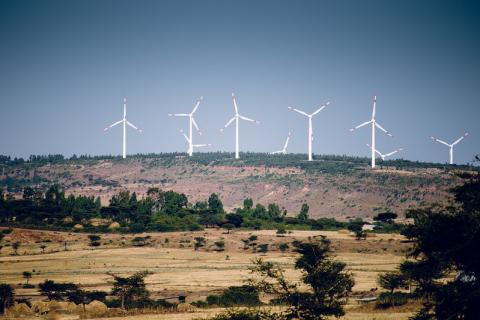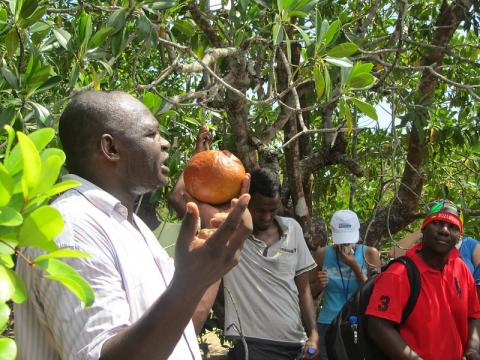Economic recovery from Covid-19: Prospects for sub-Saharan Africa
Economic recovery from Covid-19: Prospects for sub-Saharan Africa
Governments seek to return to pre-Covid levels of economic activity, and there is much discussion on how to build back ‘greener’. Lauren Hermanus looks at what is happening to achieve a green Covid recovery, and what is missing from current plans.
The opportunity for a green recovery in Africa
Early in the pandemic, the global economic recession was quickly reframed as an opportunity to drive climate compatible and green investments. The idea that countries could “build back better”, greener, and cleaner, echoed from public to political spheres. It filtered into emergency spending and economic stimulus package design.
But these efforts beg the questions: Is Covid the only ailment from which African economies need to recover? How much recovery is currently being enabled? And how green is it? Certainly, in Sub-Saharan Africa, green recovery falls short of responding to the region’s structural economic and environmental crises.
The variation in definitions of ‘green recovery’ makes tracking it difficult, everywhere. Still, it is possible to highlight some international trends:
- Sustainable investments are often offset by greenhouse gas emitting and polluting investments.
- Major green recovery investments are concentrated in just a few countries in the global north that can afford it (with the European Union leading).
- Most sustainable investments are energy-related, particularly directed into already well-supported renewable energy generation. Biodiversity conservation and nature-based solutions are neglected.
The picture is not without opportunity, but it fails to seriously respond to the climate crisis or the Sustainable Development Goals (SDGs).
Recovery from what?
By May 2020, most sub-Saharan African governments had instituted a version of a "lockdown". These included restrictions on business operations, mobility, movement within and across international borders, and public gatherings. Overstretched healthcare systems needed careful protection and management. In 2022, these initially short-term lockdowns remain in place to some extent. Their intensity follows the waxing and waning of infection rates and the impacts have been disastrous:
- decreased public revenues (tax collection)
- reduced gross domestic product (GDP) (up to 7.8% for some economies)
- depressed formal and informal economic activity and increased unemployment
- decreased remittances (approximately 25%) to sub-Saharan Africa
- increased extreme poverty (more than 40 million additional people)
- a 6% decrease in energy access reported for 2020
- increased food insecurity.
Covid-19’s impact across the region is indisputable. While the impact is acute, it interacts with chronic problems. Unemployment, underinvestment, unsustainable debt, governance woes and climate change are enduring structural challenges that predate the pandemic.

What’s included in economic recovery plans, and how green are they?
Early indications suggest that sub-Saharan Africa’s Covid-19 recovery and development assistance will not be transformative. The urgency and extent of the Covid-19 crisis have meant that countries’ recoveries remain largely in short-term rescue mode. Uneven vaccine access and uptake also undermine recovery from a public health crisis that has not ended.
Short-term rescue actions include:
- Governments have sought debt relief, implemented corporate tax deferrals and exemptions, and made direct citizen transfers and interest rate adjustments. For example, the Ghanaian government announced the provision of free electricity and water for periods in 2020 and 2021.
- Governments also implemented guarantees and subsidies, liquidity support and food relief. Ethiopia has mobilised a USD200 million credit facility, together with a USD312.5 million grant under Ethiopia's Adaptive Safety Net Project (SEASN). These actions aim to encourage mobile banking uptake and facilitate liquidity support.
- There have also been examples of support for micro, small and medium enterprises (MSMEs), such as the Nigerian National MSME Survival Fund, with 60% reserved for women entrepreneurs. These initiatives are not particularly green, but they are necessary. Cash transfers and other safety nets for poor and vulnerable populations are critical for an integrated climate crisis response. While not transformational, they are building blocks for a basic level of resilience to external shocks.
Despite recovery spending across sub-Saharan Africa being emergency-oriented, some of it is still green. Governments have continued to develop policies and plans that bring climate resilience and economic development together. The feasibility of implementation or scaling up pilot investments depends on the availability and terms of funding and finance. In addition, there are major gaps in terms of where ‘green’ resources are flowing: they are bypassing important network infrastructure, for example, and critical risk mitigating investments in ecological restoration and conservation. Nonetheless, important examples of green spending with ecological and economic benefits include:
- Building on existing work, the African Union has developed the African Union Green Recovery Action Plan.
- Several countries have also updated their Nationally Determined Contributions (NDCs) with ambitious climate mitigation and adaptation targets.
- Sustainable energy transitions also continue to attract renewable energy investment at utility and small scales.
- While problems endure, there are examples of conservation spending and green job creation in Kenya, and a National Environment and Climate Change Fund in Mauritius for coastal rehabilitation and environmental monitoring.
Rescue spending and green economy initiatives are essential, but insufficient to change the region’s developmental trajectory. Two pre-Covid barriers to more transformational strategies persist. First, unsustainable investments (e.g. new coal exploration) are still seen as economic opportunities without viable alternatives. Second, available international climate and green finance fall distressingly short of requirements and commitments.

Shifting the trajectory for sub-Saharan African development
The opportunity for sub-Saharan Africa’s green economic development is not a window that has opened and closed. Within the region’s complex socio-economic and ecological context, there are always mechanisms to shift and enhance development toward more sustainable outcomes. There is much to be done to connect rescue to recovery, and to a long-term sustainable transition. More equitable access to and uptake of vaccines is undoubtedly an urgent short to medium-term matter. However, decision-makers should address several important longer-term issues as the region's recovery is scaled up and greened. Among these factors, the following are critical:
Transparency in funding, finance and technical support to sub-Saharan African governments is critical for effective spending and to foster and support political and administrative accountability.
- Existing green investment flows, such as renewable energy, should focus more intently on localisation, job creation and poverty alleviation.
- The informal economy should be integrated into recovery plans.
- Investment gaps such as those in biodiversity conservation should be linked to risk management in policy and investment decisions.
- Covid-19 development assistance should be institutionalised and connected to long-term planning.
The monitoring and evaluation of projects should be development in its orientation, driving learning, adaptation, and, ultimately, impact.
Sub-Saharan Africa must not aim to bounce back to the unsustainable forms of development it pursued before the pandemic. A new trajectory requires a new development deal for the region. This deal needs to be green, yes. But it also needs to be transparent, fair, and realistic to tackle the scale and depth of endemic development challenges.
